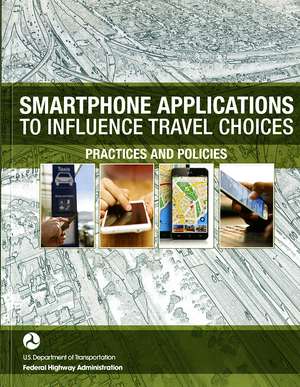Smartphone Applications to Influence Travel Choices: Practices and Policies: Practices and Policies
Autor Federal Highway Administration (U.S.)en Limba Engleză Paperback – 13 feb 2017 – vârsta ani
This
primer
is
intended
to
demonstrate
how
vital
smartphones
are
becoming
to
the
transportation
network
and
provide
public
agencies,
transportation
managers,
and
elected
officials
with
a
perspective
and
understanding
the
role
of
smartphones
in
identifying
services
and
choices
for
individuals
and
influencing
travel
behavior.
Whether
a
sophisticated
or
new
adapter
to
smart
phones,
this
publication
provides
the
foundation
to
maximize
the
value
of
this
new
technology
as
well
as
a
history
of
how
the
technology
has
developed
and
could
benefit
commuters.
This
report
also
outlines
the
challenges
including
protecting
consumer
privacy
and
data
that
is
more
widely
available
through
thie
smartphone
apps
.
Audiences: Business and personal users of smart phones, telecommunications experts and students, telemarketers, cyber-security administrators, and commuters may benefit from this report.
Other products that may be of interest:
YouTube War: Fighting in a World of Cameras in Every Cell Phone and Photoshop on Every Computercan be found here: https://bookstore.gpo.gov/products/sku/008-000-01071-4
Transportation Security collectioncan be found here: https://bookstore.gpo.gov/catalog/security-defense-law-enforcement/transportation-security
Other publications produced by theUnited States Department of Transportationcan be found here: https://bookstore.gpo.gov/agency/199
Audiences: Business and personal users of smart phones, telecommunications experts and students, telemarketers, cyber-security administrators, and commuters may benefit from this report.
Other products that may be of interest:
YouTube War: Fighting in a World of Cameras in Every Cell Phone and Photoshop on Every Computercan be found here: https://bookstore.gpo.gov/products/sku/008-000-01071-4
Transportation Security collectioncan be found here: https://bookstore.gpo.gov/catalog/security-defense-law-enforcement/transportation-security
Other publications produced by theUnited States Department of Transportationcan be found here: https://bookstore.gpo.gov/agency/199
Preț: 222.30 lei
Nou
Puncte Express: 333
Preț estimativ în valută:
42.54€ • 46.35$ • 35.84£
42.54€ • 46.35$ • 35.84£
Carte indisponibilă temporar
Doresc să fiu notificat când acest titlu va fi disponibil:
Se trimite...
Preluare comenzi: 021 569.72.76
Specificații
ISBN-13: 9780160936098
ISBN-10: 0160936098
Pagini: 185
Dimensiuni: 216 x 279 x 6 mm
Editura: United States Dept. of Transportation
Colecția United States Department of Transportation
ISBN-10: 0160936098
Pagini: 185
Dimensiuni: 216 x 279 x 6 mm
Editura: United States Dept. of Transportation
Colecția United States Department of Transportation
Recenzii
Reviewed
in
GovBook
Talk
Blog
post Article:
Smartphones
Make
Traveling
Fun
and
Easy! https://govbooktalk.gpo.gov/
dated
March
15,
2017
Cuprins
TABLE
OF
CONTENTS
CHAPTER 1. INTRODUCTION AND OVERVIEW
Introduction
CHAPTER 2. BACKGROUND: SETTING THE STAGE
Background and Evolution of Smartphone Apps
Phase 1: Basic Hardware, Basic Applications: Early 1980s to Late-1990s
Phase 2: Emergence of Mobile Data: Mid- 1990s to Mid-2000s
Phase 3: Step Change in Hardware and Software: Mid 2000s to 2007
Phase 4: Platform Wars: 2007 to Present
Phase 5: Advanced Hardware, Advanced Applications: 2014 to Present
Summary
CHAPTER 3. SMARTPHONE APPLICATION TYPES PROMOTING TRANSPORTATION EFFICIENCY AND CONGESTION REDUCTION
Types of Apps Impacting Transportation
Mobility Apps
Vehicle Connectivity Apps
Smart Parking Apps
Courier Network Services (CNS) Apps
Non-Transportation Apps Deploying Strategies that May Be Useful for Transportation Apps
Health Apps
Environment/ Energy Consumption Apps
Insurance Apps
Smartphone App Characteristics
Operating Systems
Geographic Availability
App Business Models
Real-Time Information Availability
Gamiication and Incentives
Mobility Apps
Business-to-Consumer Sharing Apps
Mobility Tracker Apps
Peer-to-Peer Sharing Apps
Public Transit Apps
Real-Time Inormation Apps
Ridesourcing Apps
Taxi e-Hail Apps
Trip Aggregator Apps
Vehicle connectivity Apps
Smart Parking Apps
Courier Network Services Apps
Health Apps
Environment and Energy Consumption Apps
Insurance Apps
Summary
CHAPTER 4. TRANSPORTATION APPS AND THEIR IMPACTS ON TRAVELER BEHAVIOR
Cognitive Impacts
Actual and Perceived Control
Privacy Safeguards
Trust 42
Reframing Norms and Defaults of Transportation Choices
Price and Value Impactinig App Adoption and Usage Choices
Information Availability
Social Pressure
Delivery of Incentives
Conclusion
CHAPTER 5. CURRENT CHALLENGES
Privacy Concerns
Open Data and Interoperability Among Services and Modes
App Authorization
Accessibility Considerations
Bridging the Digital Divide
Service and Data Limitations in Rural and Less Urbanized Locations
Unbanked Users
Addressing Special Needs
Additional Challenges
CHAPTER 6. GUIDING PRINCIPLES FOR PUBLIC AGENCIES
Data Sharing and Interoperability
Open Data
Data Exchanges
Encouraging Multi-Modality
Enhancing Multi-Modal Payment Mechanisms
Expanding Commuter Benefits
Protecting Consumer Privacy
ACKNOWLEDGEMENTS
REFERENCES
CHAPTER 1. INTRODUCTION AND OVERVIEW
Introduction
CHAPTER 2. BACKGROUND: SETTING THE STAGE
Background and Evolution of Smartphone Apps
Phase 1: Basic Hardware, Basic Applications: Early 1980s to Late-1990s
Phase 2: Emergence of Mobile Data: Mid- 1990s to Mid-2000s
Phase 3: Step Change in Hardware and Software: Mid 2000s to 2007
Phase 4: Platform Wars: 2007 to Present
Phase 5: Advanced Hardware, Advanced Applications: 2014 to Present
Summary
CHAPTER 3. SMARTPHONE APPLICATION TYPES PROMOTING TRANSPORTATION EFFICIENCY AND CONGESTION REDUCTION
Types of Apps Impacting Transportation
Mobility Apps
Vehicle Connectivity Apps
Smart Parking Apps
Courier Network Services (CNS) Apps
Non-Transportation Apps Deploying Strategies that May Be Useful for Transportation Apps
Health Apps
Environment/ Energy Consumption Apps
Insurance Apps
Smartphone App Characteristics
Operating Systems
Geographic Availability
App Business Models
Real-Time Information Availability
Gamiication and Incentives
Mobility Apps
Business-to-Consumer Sharing Apps
Mobility Tracker Apps
Peer-to-Peer Sharing Apps
Public Transit Apps
Real-Time Inormation Apps
Ridesourcing Apps
Taxi e-Hail Apps
Trip Aggregator Apps
Vehicle connectivity Apps
Smart Parking Apps
Courier Network Services Apps
Health Apps
Environment and Energy Consumption Apps
Insurance Apps
Summary
CHAPTER 4. TRANSPORTATION APPS AND THEIR IMPACTS ON TRAVELER BEHAVIOR
Cognitive Impacts
Actual and Perceived Control
Privacy Safeguards
Trust 42
Reframing Norms and Defaults of Transportation Choices
Price and Value Impactinig App Adoption and Usage Choices
Information Availability
Social Pressure
Delivery of Incentives
Conclusion
CHAPTER 5. CURRENT CHALLENGES
Privacy Concerns
Open Data and Interoperability Among Services and Modes
App Authorization
Accessibility Considerations
Bridging the Digital Divide
Service and Data Limitations in Rural and Less Urbanized Locations
Unbanked Users
Addressing Special Needs
Additional Challenges
CHAPTER 6. GUIDING PRINCIPLES FOR PUBLIC AGENCIES
Data Sharing and Interoperability
Open Data
Data Exchanges
Encouraging Multi-Modality
Enhancing Multi-Modal Payment Mechanisms
Expanding Commuter Benefits
Protecting Consumer Privacy
ACKNOWLEDGEMENTS
REFERENCES
